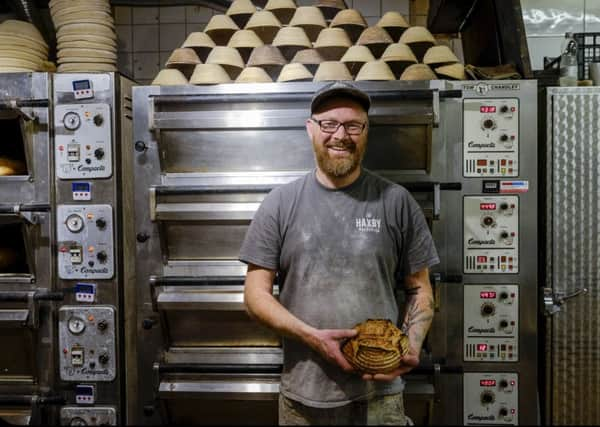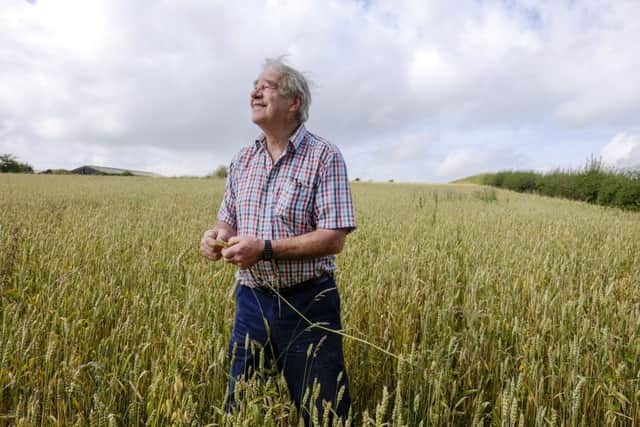Our daily bread: A slice of life for the sourdough boys


It’s turned into flour traditionally, first going through a seed cleaner where the chaff and dust is taken out. The grain is then filtered through a series of sieves and transported into the milling room where three mills employ granite stones quarried near Castres in France, home to the revered Astrié brothers: engineers who developed their mills from a long-standing tradition of mill-making in Brittany.
Philip says: “The brothers believed strongly that bread should be at the very centre of all communities. As they got older, bakers and followers would make annual visits to their home and almost sit at their feet. Our mills were the first of their kind to be imported and installed in this country.
Advertisement
Hide AdAdvertisement
Hide Ad“I first came across them during a visit to France where, after seeing some flour in a bio-supermarket, I followed up the miller and copied his methods. Before being allowed to buy a mill I had to present my organic farming credentials to the Astriés.”


The patterns of the grooves in the millstones at Spaunton are different to other stone mills, rolling and mixing the goodness into the flour in a unique way to give a creamy finish which retains the maximum nutritional value of the whole grain.
Philip first grew milling wheat after an old farmer in Spaunton said he remembered spring wheat being grown successfully in small fields at Hill Top Farm.
In 1976, he harvested his first crop of Maris Dove and delivered it to the newly established Little Salkeld Watermill in Cumbria whose flour had interested Andrew Whitley, founder of the Village Bakery at Melmerby, author of Bread Matters, co-founder of the Real Bread Campaign and widely regarded as the man behind the current resurgence in breadmaking.
Advertisement
Hide AdAdvertisement
Hide AdThese days, organic wholemeal and white flour from Spaunton makes a shorter journey of less than 30 miles to Haxby, on the outskirts of York. Pass by the Haxby Bakehouse in the early hours and you’ll see a small team of artisan bakers led by Phil Clayton working to produce handmade bread, sweet doughs and croissants. On a Friday shift, more than 1,000 loaves are baked ready for Saturday markets, wholesale orders and Phil’s shop.


Phil started the bakery eight years ago after a career in retail management with Virgin Megastores. He had worked in towns and cities across northern England and noticed a lack of decent bread.
“I started making bread at home once or twice a week, mainly for pack-ups for the children’s school lunchbox,” he says.
On discovering that a local health food shop with a small bakery at the back was up for sale in Haxby, he took the plunge. He attended one of Andrew Whitley’s courses and gradually moved the shop to a full-time bakehouse where all the bread is made using traditional methods of slow fermentation: low yeasted overnight sponges and natural sourdough levain made with organic flours, including those milled at Spaunton.
Advertisement
Hide AdAdvertisement
Hide Ad“I first came across Yorkshire Organic Millers at York Food Festival six years ago,” says Phil. “It made sense to use produce from a mill less than 30 miles away. Local wheat: it’s not groundbreaking. Flour is the basis of what we do, so we don’t compromise on that. All that goes into a Yorkshire Mill Sourdough is flour, water and salt. The rest is experience and technique.
“We make bread honestly, simply and with integrity. It shouldn’t be a special treat once a week on Saturday: we want to see people coming in for their daily loaf as they do on the continent.”
The Yorkshire Mill Sourdough, which won first place in the 2013 World Bread Awards, is half wholemeal, half white flour, all stoneground at Hill Top Farm.
The process is a slow one, beginning at around 8am with the addition of flour and water to a portion of sourdough starter to make a “levain”. This is then added to flour and water with a little salt and the slow fermentation process begins in earnest. Around midnight, after earlier being shaped into proving baskets, the loaves hit the ovens.
Advertisement
Hide AdAdvertisement
Hide AdThe bakers’ shift ends at around 6am and by 10am on Saturday the loaf is on the Haxby Bakehouse market stall in Hovingham Market, with a label that says it all: “50 per cent wholemeal, 50 per cent white, 100 per cent Yorkshire”.
Haxby Bakehouse: haxbybakehouse.co.uk
Yorkshire Organic Millers: yorkshireorganicmillers.co.uk
The Real Bread Campaign: realbreadcampaign.org